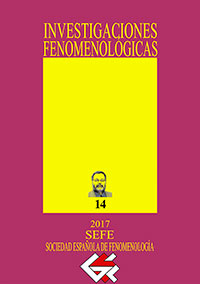Un análisis fenomenológico de la propiedad contrapuesto al new realism de Maurizio Ferraris
DOI:
https://doi.org/10.5944/rif.14.2017.29633Palabras clave:
propiedad, objeto social, Lebenswelt, new realism, property, social objectResumen
El presente ensayo compara un análisis fenomenológico de la propiedad con el nuevo realismo de Maurizio Ferraris. La comparación expone los límites de la perspectiva fenomenológica al mismo tiempo que también muestra los momentos estructurales de su modo de dación: (1) momento intuitivo; (2) momento de la solicitud; (3) momento del reconocimiento; (4) momento de la propiedad. Una vez expuesta la unidad de estos momentos, el ensayo pone de manifiesto cómo la perspectiva del nuevo realismo pensaría la propiedad a través de la nueva ontología del objeto, es decir, como un objeto social vinculado a un acto social. Las conclusiones exponen el carácter fenoménico de la propiedad como condición del análisis fenomenológico, en contraposición al planteamiento de Ferraris, donde la propiedad sería tratada como un objeto. No obstante, ambas perspectivas pensarían la propiedad como un acto vinculado al deseo de apropiación, lo que permite una inves-tigación fenomenológica de la voluntad.
The present essay compares a phenomenological study of the property with the new realism of Maurizio Ferraris. The comparison shows the limits of the phenomenological perspective and simultaneously the structural moments of its mode of givenness: (1) the intuitive moment; (2) the moment of the request; (3) the moment of the admission; (4) the moment of the ownership. Once the unity of these moments is exposed, the essay shows how the perspective of the new realism would think the property through a new ontology of the object, that is, as a social object related to a social act. The conclusions expose the phenomenological character of the property as a condition of the phenomenological approach in contrast to the Ferrari’s proposal, where the property would be treated as an object. Nevertheless, both perspectives would think the property as an act related to the wish of appropriation, which allows the phenomenological investigation of the will.
Descargas
Descargas
Publicado
Cómo citar
Número
Sección
Licencia
![]()
Reconocimiento (by): Se permite cualquier explotación de la obra, incluyendo una finalidad comercial, así como la creación de obras derivadas, la distribución de las cuales también está permitida sin ninguna restricción.







